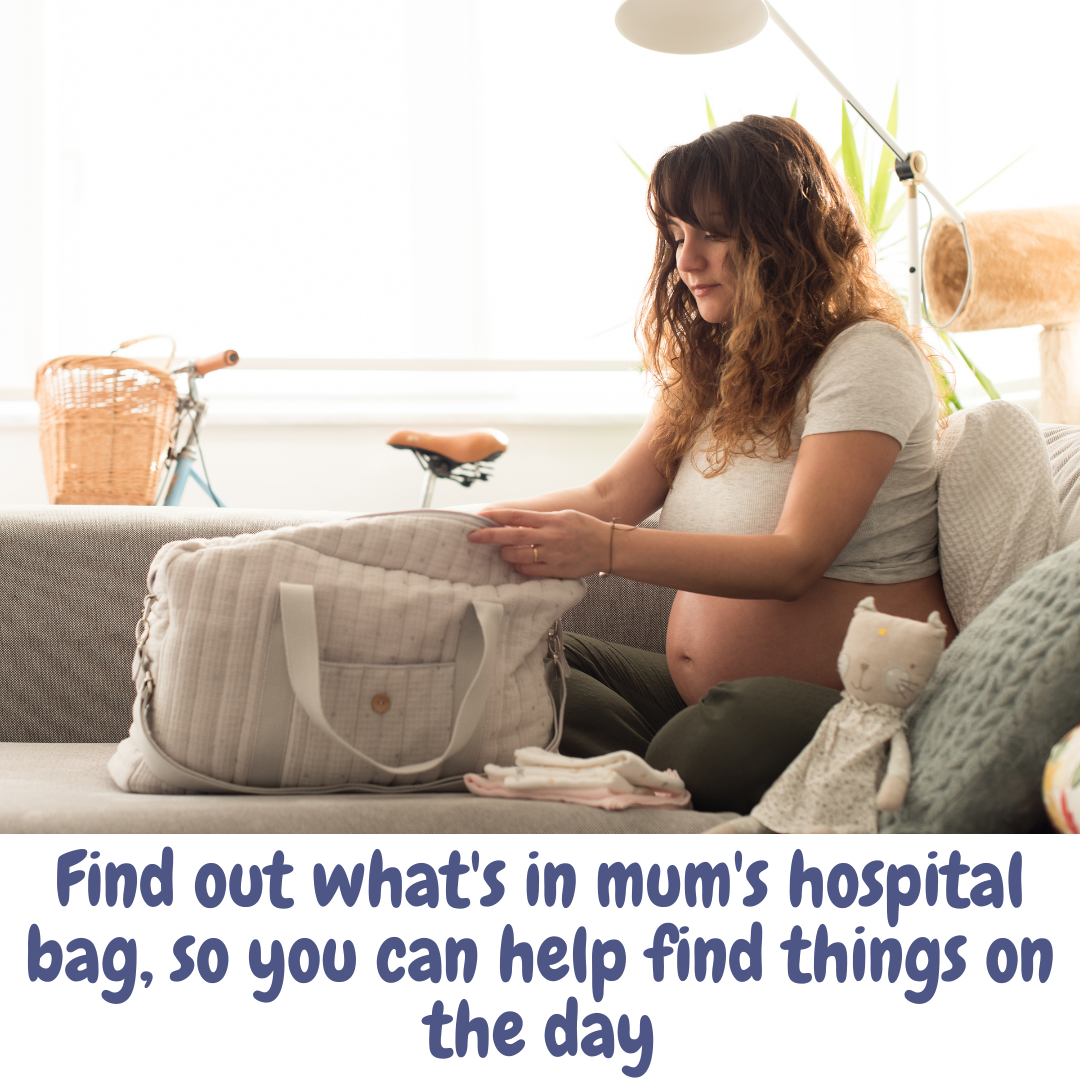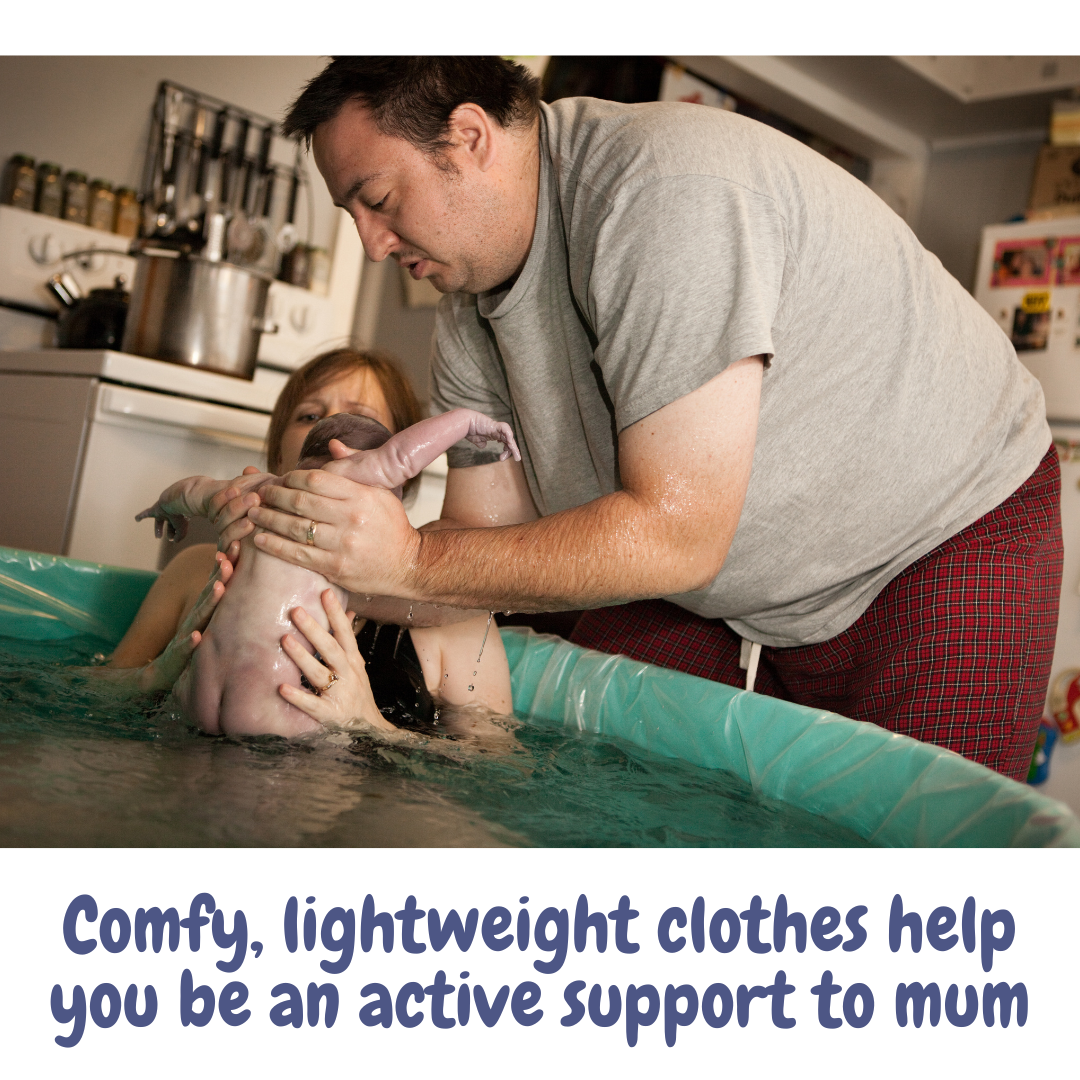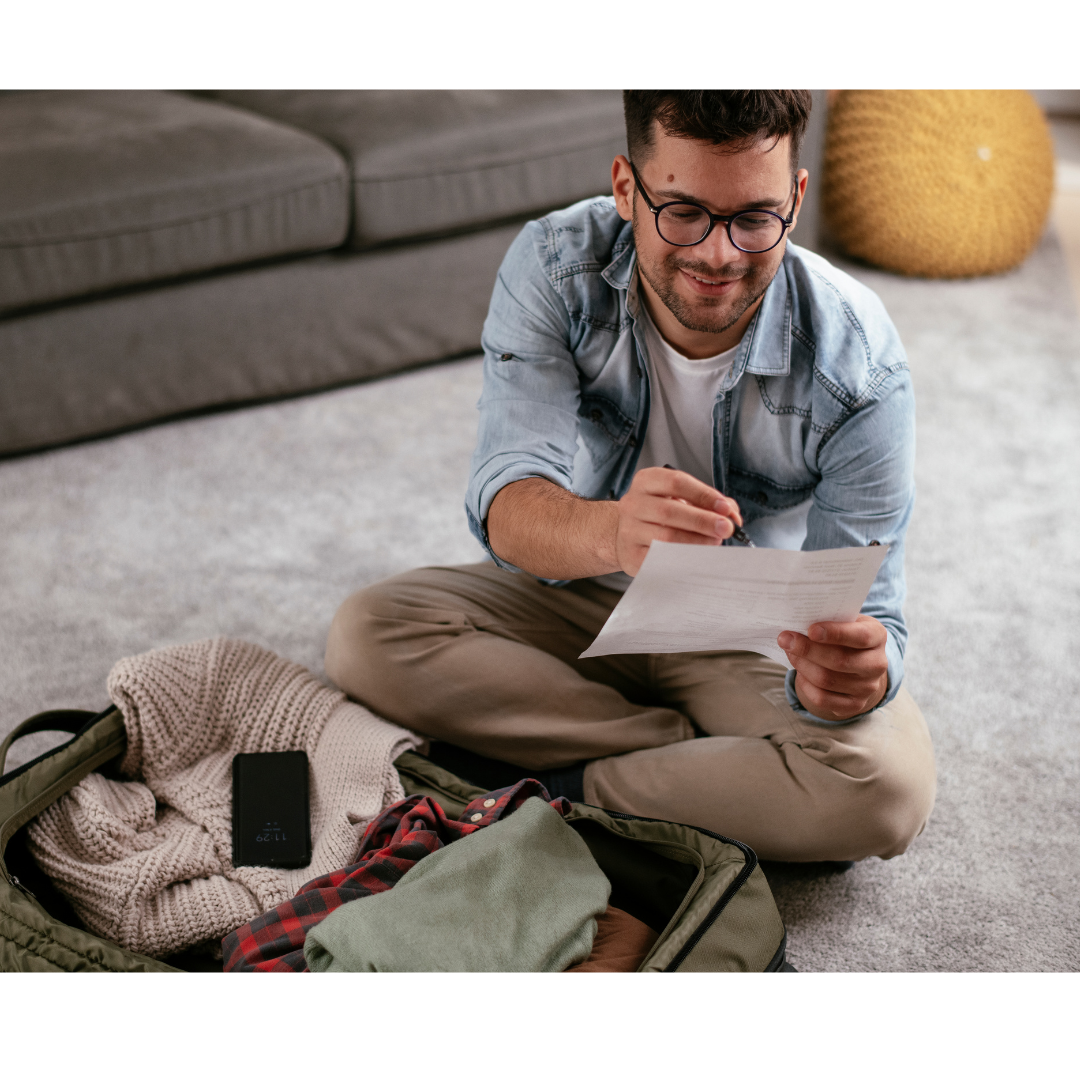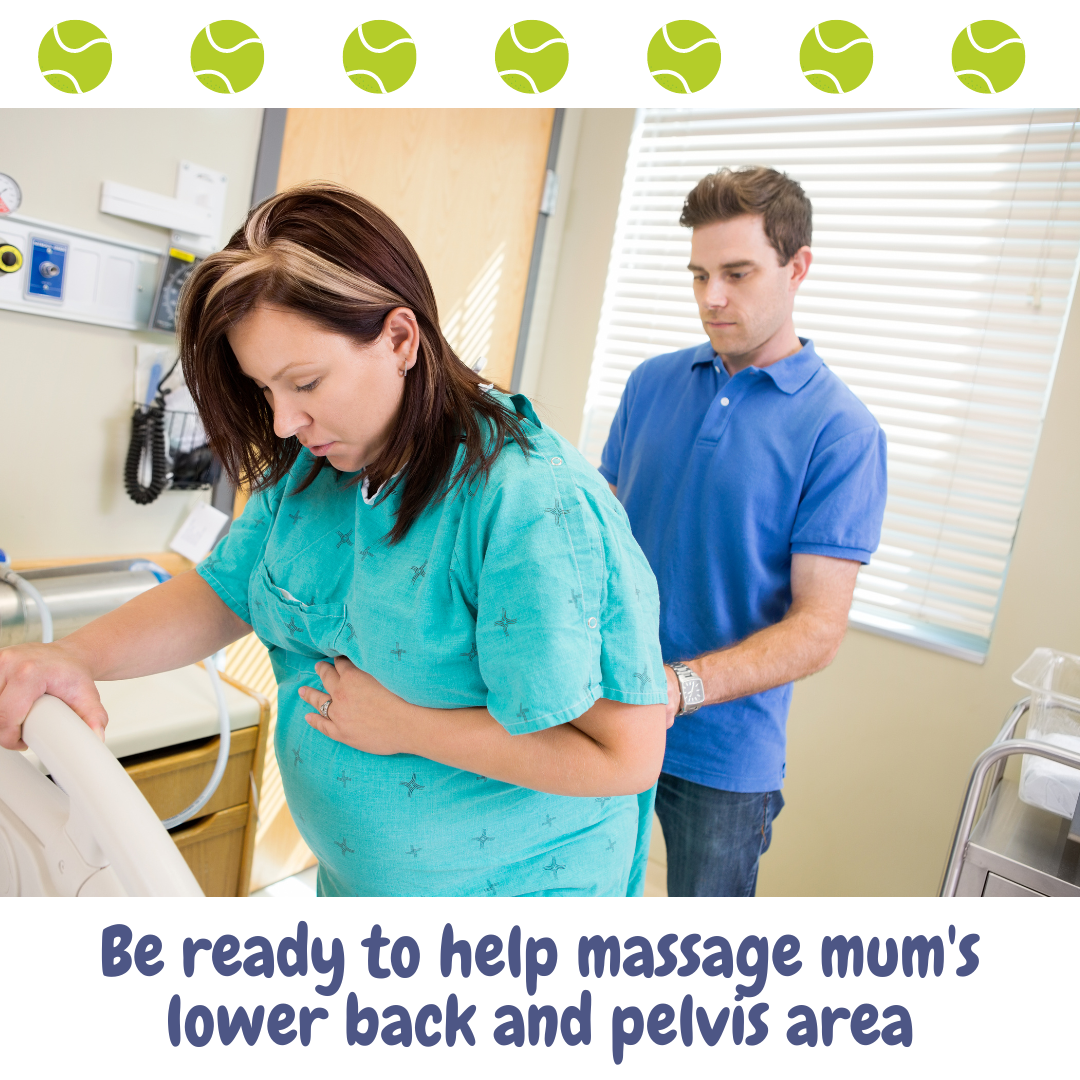
Ask DadPad, Being a Dad, Labour and Birth
Ask DadPad: What do I need to put in MY hospital bag, as a birth partner?
Posted on 9th December 2022
Getting ready for baby’s birth is such an exciting time for all parents-to-be – and there’s lots of things to do, buy, get ready and pack. Mum’s ‘hospital bag’ is one such item, and her Midwife will be discussing with her what she needs to include. But what about you? What things should you get ready to pack to take with you when mum goes into labour? We’ve asked Georgie to put together a helpful blog on this often-overlooked topic as well as helping dads gain a better understanding of mum’s hospital bag, too…
The final weeks of pregnancy…
In the final weeks of your partner’s pregnancy, you may become aware of them focusing a lot of their time and energy in preparing for your upcoming arrival. After months of waiting, stashing away bits and pieces for later, suddenly it’s time to get everything out (and to put things together).
‘Nesting’ is a common occurrence for women in the last weeks of pregnancy. Whether or not the cot has been up for a while, the pram has been purchased, or there’s been what seems like a never-ending rotation of baby clothes on your drying rack, one of the most important tasks you can participate in as a dad-to-be right now is to help to pack the hospital or birth bags for both of you.
[NB. For simplicity, we’re going to call it the ‘hospital bag’ throughout this blog].
Why is packing a hospital bag important?
There is a lot of information out there already on what mum will need to pack for herself (and baby) for labour, birth and/or a stay on a postnatal ward (the ward for those who have already given birth), so today this blog is going to focus on what you – the dad – might want to know about hospital bags, what to pack for yourself, and some suggestions for some handy birth-partner-tools.
Wherever you and your partner have decided to give birth, it is still wise to pack a bag with the essentials, should you need to move quickly. What is going to happen during labour, the birth and immediately afterwards can feel uncertain, especially if this is your first baby, so it is best to get prepared before your partner goes into labour, in order to reduce any stress or anxiety either of you may be feeling.
It’s a good idea to know what your partner has packed for herself and your baby, as you are going to need to know where to look in the bag or be able to direct a Midwife if you are busy supporting your partner. Why not ask if you can pack together with her or ask her to give you a ‘tour’ of what she has already packed?

Planning a Birth Centre or hospital birth…
If you are planning for a birth at a Birth Centre or a hospital, your partner will need all of her essential labour and birth items in a small suitcase, so that you can open it up and easily see everything inside. She will also want a separate bag with her toiletries, pyjamas, comfortable clothes and footwear, plus her post-birth essentials and some baby essentials. If your partner is worried about what she needs to pack for herself or your baby, you can both check out this essentials list and video by NHS England.
Don’t worry about not having enough or forgetting something, though, as hospitals can always provide or lend out items for your partner, your baby and you, if necessary. Also, after your baby has been born, you can bring in anything extra that your partner or baby needs, once you’ve had the chance to recover from supporting the birth.
What if we’re having a home birth?
If you are planning a home birth then it’s still a good idea for the two of you to put a box together with all of mum and baby’s essential items for labour and birth, and also to pack a bag with some overnight essentials for her and baby, too. This way, you will know where to look or be able to direct your Midwife to the items if your partner asks for something during labour, and/or if you need to transfer to hospital for any reason.
If you do need to transfer to hospital during labour or after the birth, you’ll already have everything you need ready, so you can stay focused on your partner and baby; and, at the very least, the box and bag will be easy to grab quickly on your way out of the door in an emergency.
What do you need to pack for yourself?
You might well be thinking “what do I need a hospital bag for? I’m not the one giving birth?!”, which is true, but this underestimates the importance of your role as a birth partner and dad-to-be. Labour can be a long process, particularly if it’s your partner’s first baby, if your partner has chosen to be induced, or if things aren’t going as expected.
You could find yourself having to support your partner through the process of giving birth over a period of hours or even days, so it’s important that you pack some essentials for yourself, too, in case you want freshen up in order to stay focused during the birth, or if you end up staying overnight with your partner during labour or after the birth.
Birth Centres, labour wards and delivery suites tend to be very warm places, so it’s unlikely you’ll want to stay in the clothes you arrived in – especially if you are wearing clothes for the cooler seasons, like today. Also, if your partner is having an active labour (one where they want to move around and regularly change positions), then it’s likely you are going to be quite active yourself and you’ll be most comfortable doing so in lighter clothing.

Supporting your partner in different positions or in and out of the shower, bath or birth pool consumes a lot of energy, too (take it from a Doula who knows: supporting birth can sometimes be quite the work-out!). So, in addition to lighter clothing, you will definitely also need extra drinks, food and snacks on hand to keep you going, in addition to your partner’s supply.
Labour isn’t always this way, though, and you could also find yourself having to keep yourself or your partner occupied for long periods of inactivity, particularly if you are supporting your partner through the early induction process, they have had an epidural (pain relief which is inserted into their spine via a tube and which usually means they will be labouring on a bed) or are having an elective Caesarean birth. There is nothing worse than an agitated or bored birth partner in the room of a labouring mum, and it can also create unnecessary conflict between you and your partner during a vulnerable process. Make sure you pack something to entertain yourself, or help distract both you and your partner during a long wait!

DadPad’s Hospital Bag Essentials for Dads-to-Be…
So, in the light of all this, here’s our suggested list of ‘Hospital Bag Essentials for Dads-to-Be’:
- Phone and charger – so you definitely have enough charge left to capture those special first moments together, and to keep friends and family updated with news;
- Wallet – with some loose change, just in case, for things like hospital parking and vending machines (check in advance what the parking and parking-payment arrangements are – most hospitals have this info on their website – and get relevant cash prepared and ready if you’re going to need it);
- Something to pass the time – like a book, magazines, playing cards, travel game, puzzle or activity book, music, audio book, film or TV series (and don’t forget to download in advance anything that you might want to watch or listen to, as NHS Wi-Fi isn’t always reliable for streaming, and phone reception can be intermittent in hospitals);
- Shorts, T-shirt, and flip flops – so you are comfortable supporting your partner in the birth room or if you need to support your partner in or near water;
- A spare set of comfortable clothes – in case you get wet or dirty during the birth and/or if you end up staying with your partner overnight; and
- Essential toiletries and a towel – so you can freshen up when you need to.

Being the ultimate Birth Partner…
Anyone can be a fantastic birth partner – it’s not really about the equipment you bring, but about how you show up for your partner. Your baby’s mum is likely to go through a whole spectrum of emotions during the process of labour and birth, and having someone there by her side to help her feel loved, safe, held and calm is crucial. If you don’t think you’re that person, don’t beat yourself up about it or hide it; it’s better to have a chat with your partner about it long before she goes into labour and to be honest about your feelings.
Sometimes a lack of knowledge is all that stops men from feeling confident about being a good birth partner, which can be easily fixed by attending some sort of antenatal education or birth preparation classes together. Sometimes, arranging to have a second birth partner at the birth can help ease the pressure that some men feel about being the birth partner and share the load. And lastly, it is OK if the best thing for your partner and you is that someone else entirely acts as your partner’s birth partner, because what matters most is that your partner gets the support she needs.
However, if you are preparing to be the main birth partner or are helping someone else prepare to be, here are some handy tools which you might want to pack…
Birth Partner Kit:
- A copy of the Birth Plan – and do make sure you’ve read this yourself, and spoken to your partner and/or your Midwife so that you’re clear that you understand everything;
- Yoga or Peanut Ball – for mum to bounce on or sit on during labour;
- Battery-operated candles or fairy lighting – to help make the hospital room more cosy;
- Dressing gown or comfort blanket (it might even be yours) – to help your partner feel at home;
- Wash-cloth or cool cloth – to help cool your partner down or mop her brow;
- Refillable water bottle – as it’s important for mum to be able to keep hydrated;
- Straw (preferably re-usable) – which will help your partner stay hydrated, whatever position she’s in;
- Tennis ball – for you to use to massage mum-to-be’s lower back and pelvic area;
- Comb – for your partner to squeeze in the palm of her hand (a great pain distraction and acupressure pain relief trick);
- Mum’s chosen food and snacks;
- Honey or Jelly Babies – for an instant energy boost if your partner is tiring;
- A receptacle for the placenta – if your partner would like to keep it (a clean ice cream tub will do);
- An insulated bag with ice packs to safely transport any expressed and frozen colostrum into hospital – if your partner has been harvesting colostrum for baby (she may have done this if she has planned to have a Caesarean birth or if she’s had some pregnancy complications which could mean she will need some extra milk for the baby).

